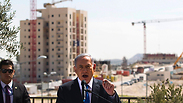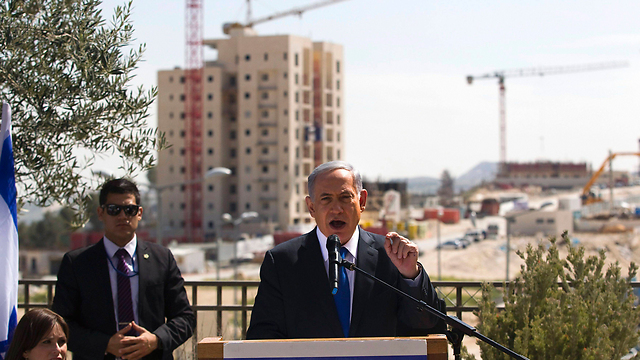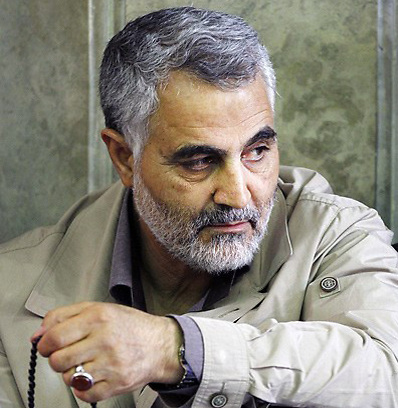
Settlement construction freeze as a missed opportunity
Op-ed: Why wasn't the declaration of construction freeze outside the main settlement blocs not made during peace talks with Kerry? Why wasn't it made in order to prevent the unnecessary conflict with Europe and the American administration?
The most right-wing government in Israeli history froze, for all intents and purposes, the construction outside the main settlement blocs in the West Bank. Settler leaders have been complaining about this freeze for a long time. Now Netanyahu, in his own voice and not off-the-record, is declaring that there is a freeze. If it hadn't been for the agreement with Iran, Netanyahu's statement would have shaken Israel.
It's a shame, though, that this statement came a bit late. Why wasn't it made in the days of negotiations under the auspices of John Kerry? Why wasn't it made in order to prevent the unnecessary conflict with the European Union, European countries and the American administration? This sort of statement should be welcomed. Anything that saves us from the horrifying vision of one big state is a blessing. But it's a shame it is accompanied by a feeling of missed opportunity.

Nuclear capabilities are a problem, but they're not THE problem. The problem is that Iran, for over two decades, has been stirring trouble across the Middle East. And it's only getting worse. Tehran has managed to aid Hamas, it is aiding Hezbollah, it is involved in Syria, Iraq and Lebanon, it has taken over Yemen, and is stirring trouble among Shiite minorities in the Gulf.
What ISIS is doing to Iraq and Syria, Iran is doing to Yemen. Any Iranian involvement leads to more destruction, just like any time jihad gets into the picture. Without Iranian support, the Second Lebanon War, which wreaked havoc and caused destruction in Lebanon, would not have happened. Without Iranian support, it is doubtful Hamas would have provoked conflicts that also led to ruin and destruction. Without Iranian support, Yemen would not have had to go through the experience of ruin and destruction. Iran is also behind some of the biggest terror attacks, like those that happened over two decades ago on Argentinian soil.
The Angel of Death in the Ayatollah regime is Qasem Soleimani, who spreads terrorism in every corner of the Middle East. He has nothing to do with the nuclear program, but he is a part of the agreement, perhaps to prove that this is not an agreement to curb Iran's nuclear program, but rather an agreement to encourage its subversive aspirations.
The agreement signed on Tuesday granted Soleimani a full pardon by world powers. It's not that he needed the approval of the free world in order to continue stirring trouble across the world, but the regime that operates him will now have a lot of avenues to fund its death industry.
Soleimani's subversive actions, destruction and terrorism, continued unabated regardless of the nuclear program or the sanctions, so Iran was worthy of an international boycott regardless of its efforts to develop a nuclear weapon, because Iran, more than ISIS, al-Qaeda or North Korea, is currently the most subversive element in the world. It is the only country in the world that announces its aspirations to annihilate another country.
So how did Iran manage to deceive the free world? Well, Iran's president, Hassan Rouhani, realized that the free world is desperate for calm, or at least for the façade of calm. Rouhani delivered. He is likable, nice, round around the edges and most of all - he knows how to smile. And a lot. Iran's foreign minister, Mohammad Javad Zarif, is made of the exact same materials. He has turned into Iran's display window. He's all smiles. These two don't look like dangerous enemies. They're not a bad option for friendly neighbors.
In the back yard, meanwhile, the same old calls were heard only a week ago: "Death to America, death to Israel." It happened during a rally led by Rouhani. But who wants to hear about that? It's so much more fun to live in denial. And the free world prefers denial.
Netanyahu said all the right things, in the most wrong way. It's important to notice that unlike Rouhani and Zarif, Netanyahu never smiles. He's always enraged. Always uses threatening body language. It's not just the words. He went into a head-on confrontation with the American administration instead of reaching understandings with it. It's not what he said, it's how he said it. Netanyahu, who is supposed to understand the United States a lot better than others, has failed big time. Instead of acting like the prime minister of Israel, he acted like one of the members of the Tea Party (a movement identified with the right-wing of the Republican Party).
Buji Herzog is going to Washington to represent a unified Israeli position against the agreement. Over the past few months, it was mostly Yair Lapid who recruited himself to the fight against BDS. Considering the current coalition in power, Lapid is the one who can best do the job. Lapid, of all people, as a man of the opposition, can clarify the difference between criticism of the government's policies, and the campaign against the boycott movement, which in its core rejects the existence of the State of Israel. Now Herzog joins the fight. This is how a serious opposition should behave.
Considering Netanyahu's statement about freezing construction outside the main blocs, Herzog's trip to Washington and Lapid's fight against BDS, it appears that the gaps between these rivals are growing smaller. It is possible, but only just, that something is cooking behind the scenes. With positions like these, particularly Netanyahu's, talk of a unity government can once again be put on the table.
And after all of that, it must be said: Indeed, the agreement is bad. Very bad, even. But the chances of achieving a special majority in Congress are almost non-existent. It's better to cooperate with the American administration to minimize the damage, rather than continue this head-on confrontation with Washington, which will both deepen the rift with the US and won’t lead to the agreement being cancelled.
J Street, naturally, released a statement supporting the agreement. Anywhere the free world's self-deception reaches new heights, J Street is always there, jumping at the opportunity to break new records. Journalist Jeffrey Goldberg, who is very close to Obama and conducts interviews with the president every few months, responded to J Street, saying: "If Israel's elected leader, and the head of the opposition, oppose the Iran deal, can J Street support it and still call itself pro-Israel?"
I disagree with Goldberg. There is no need to support Netanyahu's position, nor a joint position shared by Netanyahu and Herzog, to be considered pro-Israel. J Street, however, has taken stranger and more bizarre positions over the past few years. It objected, curiously, to any initiative against Iran. And actually, it's not really that curious, considering the fact J Street has strong ties to the National Iranian American Council (NIAC). This council serves as a lobby for the Ayatollah regime in the United States.
Even worse, Genevieve Lynch, who is a member of the NIAC, is also a J Street donor. In general, it's doubtful there is even one anti-Israel position that hasn't been adopted by this organization, which officially does not support BDS, but makes its operatives welcome guests in its conferences. It's always out of love. Kind of like when a husband beats his wife. Out of love, of course. Israel can feel the beating. I wonder if signs of love ever appear.
Last week, I talked about an interview published in Le Monde with Omar Barghouti and the nonsense that came out of his mouth. I got a dozen comments asking: Why aren't you publishing a response article there? Well, I did. The article was published on Thursday in Le Monde. Those well-versed in French could also find it on the newspaper's website.











